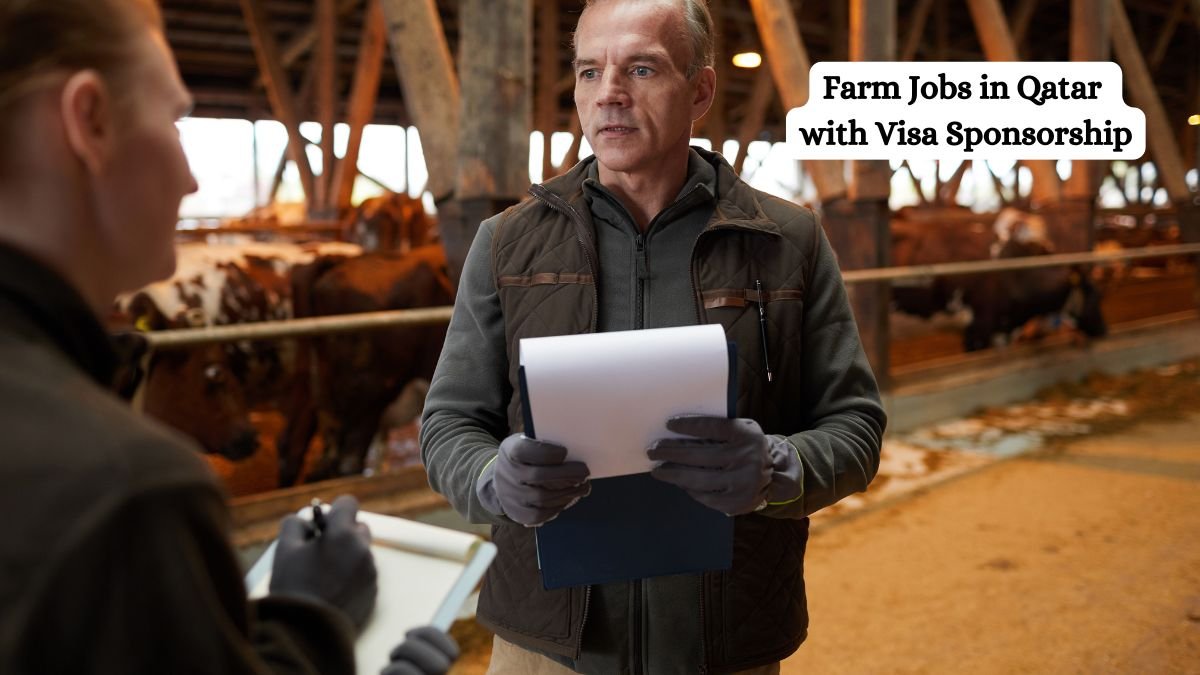Qatar is becoming a center for new ideas and progress in farming, thanks to its focus on ensuring food security and sustainability. This change has led to a higher need for skilled workers in farming, creating many job opportunities for people looking for work in this field.
What makes these jobs even more appealing is that many employers offer visa sponsorship, helping foreign workers move to Qatar and work there legally.
Why Consider Farm Jobs in Qatar?
Qatar has always depended on bringing in food from other countries because its dry weather and lack of good farmland make it hard to grow crops. But the government is now spending a lot of money on new farming methods like hydroponics, aquaponics, and greenhouse farming to rely less on imports. This change has opened up many job opportunities for people with different skill levels.
Benefits of Working in Qatar’s Farming Industry
Farm jobs in Qatar have many benefits that draw workers from different parts of the world:
- Visa Support: Most employers help with visa sponsorship, making it easier to get a work permit.
- No Taxes on Salaries: Workers don’t pay taxes on their earnings, so they can save more money.
- Housing: Many employers offer free or low-cost housing for their workers.
- Diverse Culture: Qatar has people from many countries, creating a multicultural workplace.
- Career Opportunities: The farming sector is growing fast, giving workers chances to learn new skills and move up in their careers.
Also Apply for: Farm Jobs in Norway with Visa Sponsorship 2025
Types of Farm Jobs Available in Qatar
The agricultural sector in Qatar offers diverse roles ranging from managerial positions to hands-on tasks like irrigation system maintenance or livestock care. Below is an overview of some common farm jobs available in Qatar:
| Job Title | Responsibilities | Average Salary (QAR/month) |
|---|---|---|
| Farm Manager | Oversee farm operations, manage staff, plan budgets, and ensure compliance. | 12,000 – 18,000 |
| Agricultural Engineer | Design farming equipment, optimize systems for better productivity. | 10,000 – 15,000 |
| Crop Scientist | Research crop production methods and develop pest control strategies. | 8,000 – 12,000 |
| Aquaculture Technician | Manage fish farming operations; monitor water quality and fish health. | 6,000 – 9,000 |
| Livestock Supervisor | Oversee animal care and breeding programs; ensure welfare standards are met. | 8,000 – 12,000 |
| Irrigation Technician | Install and maintain irrigation systems; ensure efficient water use for crops. | 6,000 – 9,000 |
| Fishery Officer | Monitor fish stocks; enforce fishing regulations and conduct inspections. | 7,000 – 11,000 |
Details of these Roles
1. Farm Manager
A farm manager is in charge of running all parts of a farm. This includes handling money, managing workers, planning when to plant and harvest crops, and making sure the farm follows local rules. They are important for keeping the farm running smoothly and making a profit.
2. Agricultural Engineer
Agricultural engineers create new ideas and tools to make farming better. They work on things like watering systems, ways to take care of the soil, and making farm machines work more efficiently.
3. Crop Scientist
Crop scientists study how to grow more crops. They look at the soil, find ways to stop pests, and work on changing plant genes to improve food production.
4. Aquaculture Technician
Aquaculture technicians work in fish farming. They check the water to make sure it has the right pH and oxygen levels, and they take care of the health of fish and other water animals.]
5. Livestock Supervisor
Livestock supervisors manage the care and breeding of animals on farms. They make sure the animals are healthy and that breeding plans help meet production targets.
6. Irrigation Technician
Irrigation technicians install and maintain systems that provide water to crops in the most efficient way. This job is especially important in dry areas like Qatar.
7. Fishery Officer
Fishery officers enforce fishing rules to protect ocean life. They also check fish populations and inspect fishing activities to make sure everyone follows the rules.
Qualifications Required
The requirements for jobs can differ based on the position you want:
- For beginner jobs, you might only need basic education or some experience.
- For more specialized jobs, like Agricultural Engineer or Crop Scientist, you usually need a degree or diploma in agriculture or similar areas.
- Knowing about new farming methods, such as hydroponics, can also help you stand out.
Apply: https://qa.indeed.com/q-visa-sponsorship,-farm-jobs.html



